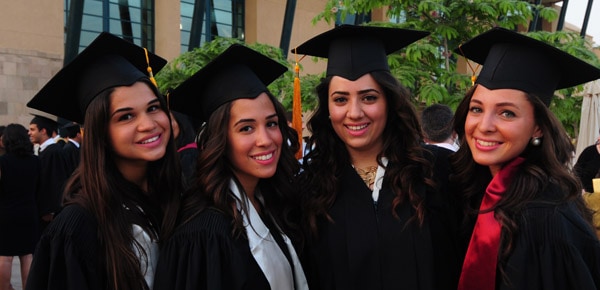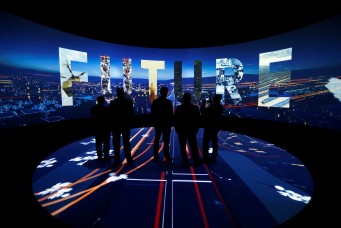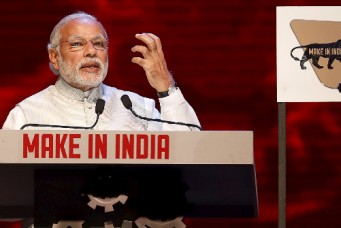We Must Dream
Replacing the Darkness of Ignorance with the Light of Knowledge.

Graduation at American University in Cairo, Cairo, Egypt, June 15, 2012. Omar Mohsen/AUC Communications Office
When I came to the United States in 1969, I was not dreaming of a Nobel Prize, nor was I dreaming of acquiring a Bill Gates fortune. Armed with the excellent education I received in Egypt, I was simply on a quest for knowledge and a PhD degree from a reputable institution in the United States. At the time, my English was so poor that at restaurants I used to order “deserts” instead of desserts. America was a magnet for many members of my generation because of its leadership in science and technology and its unique democratic values. The historic landing of Neil Armstrong on the moon in 1969 was enough to demonstrate America’s outlook regarding the frontiers of revolutionary knowledge.
I was aware of Edison’s dictum, “Genius is one percent inspiration and 99 percent perspiration,” and I took advantage of being in the right place at the right time—of being in America and at the California Institute of Technology, or Caltech. In fact, it was Caltech’s ambiance and the country’s system of support that made it possible for a young assistant professor to carry out, with his team, research that in only ten years’ time would define a discipline that was recognized by the Nobel Prize in 1999.
People often ask me, “How does one get a Nobel Prize, and what is the secret to success?” I believe it was passion for science that supplied the energy, and it was optimism that made the almost-impossible possible. Success comes to the prepared mind. Success is not like rain that falls from the sky equally upon everyone: success is what you reap when you sow with passion and optimism.
Times have changed, the world is more complex, and the America of today is not the one I came to in the 1960s. We are now in the so-called global age, threatened by chemical, biological, and nuclear disasters. The United States is facing real challenges: the rise of economic superpowers such as China and India, the conflicts and wars overseas, and—most importantly, in my view—the change in cultural, educational, and political values.
Yes, there are challenges and changes. But, if I take today’s Caltech graduates as an example, they can still make their own success in their own way. I would add that they are fortunate to have received an exceptional education in a twenty-first century, developed society. The education they received is unaffordable to at least 80 percent of the seven billion people on the planet who make less than ten dollars a day. And, just as importantly, America continues to provide them with opportunities that still cannot be found elsewhere in the world. And they are free to speak and worship as they please. And they can sleep at night without fear of the government or police. These fundamental values are embedded in the foundation of the American constitution, which is built on the pillars of life, liberty, and the pursuit of happiness.
Our world today is full of opportunity, and graduates have a unique role to play because of the special education they receive in the sciences and the rational thinking that this education has instilled. We should not listen to pessimists; but rather forge ahead to share the experience in whatever field we are passionate about, which could be business, government, law, art, or science.
I do not know the future of business or politics, but I know the future of science. This generation and the ones to come will continue to seek a basic understanding of nature and will make the many exciting discoveries that lie ahead—from deciphering and controlling the most fundamental constituents of matter to discoveries at our universe’s boundaries and the unveiling of our origin and the miracle of life.
This generation will also explore other planets and possibly reach out to other galaxies. Part of Caltech’s research is being done at NASA’s Jet Propulsion Laboratory, which developed the Mars Science Lab rover named Curiosity. In August, Curiosity will perform the first-ever precision landing on Mars and help us assess whether the planet can harbor (microbial) life.
Beyond these and other intellectual achievements, there are direct benefits to people’s liberty. From early in history, the quest for knowledge has been a driving force of revolutionary change, not only causing paradigm shifts in our understanding of the cosmos but also acting as an agent for the naissance and renaissance of human societies. The European Renaissance would have been impossible without the enlightenment regarding the significance of knowledge and rational thinking. I think too much credit is given to the impact of politics on the progress of society. Without science there is no development, and politicians would be unable to promise prosperity.
Just think: What would our world be like without electricity, penicillin, and the airplane? From the agricultural and industrial revolutions to today’s genomics and IT revolutions, science has always been at center stage for societal advancement, and graduates must surely play a leading role in conquering the next frontiers of discovery, innovation, and progress.
Even in politics, technology is becoming the new weapon for transformative change in society. The youth of this generation are now harnessing information technology to do what those of my generation thought impossible. Elsewhere in the world oppression, occupation, and human suffering still exist but young people are rising up to acquire liberty from repressive regimes. The hope I witnessed—and am witnessing—in Egypt is a telling indication of a new role for science in democracy.
A people’s revolution is sweeping the Middle East. I witnessed in real time the Egyptian uprising that began on January 25, 2011, and, remarkably led to the removal of Mr. Hosni Mubarak in only eighteen days. I saw university students in the hundreds of thousands, and then people in the millions, marching toward Tahrir Square in Cairo. The name of the square means “liberty” and that is precisely what the youth wanted from a thirty-year-old regime. They demonstrated peacefully, with impeccable organizational skills, and in unison. In my generation, we would probably have had to use stones, sticks, and guns in order to rise up; in this generation, they used Facebook, Twitter, and SMS. Without the development of the chip, wireless technology, and the Internet, this revolution may never have succeeded as a peaceful and civilized transformation.
Although the road ahead is bumpy, I am optimistic that, with investment in education and development through science, a democratic Egypt will emerge. Only a few months after the revolution began, Egypt announced the establishment of a new city for science and technology on three hundred acres of land, a national project that I have personally pushed for more than a decade.
When people in the Middle East ultimately gain their freedom, the world will be better off. Some scholars argue that the world is destined always to be embroiled in conflict and war. But this bleak picture is surely not the result of any natural phenomenon. We, the people, cause such conflicts and we, the people, can either kindle the fire or help extinguish it. The United States cannot change the culture of other people, and nations are responsible for their own plights, but it is the kismet of the United States to lead in the world by utilizing its most crucial force: the American value system of individual liberty, justice, and human rights. I believe that much can be achieved not by hegemony but by the strategic use of the real force of America—its soft power.
The soft power of science has the potential to reshape global diplomacy—and at significantly lower expense than that needed for use of the hard power of military involvement. I am hopeful that a new policy will be chartered for leadership in innovation. This policy should be inclusive of international science diplomacy for partnerships in development. Some may argue that it is naïve to think of applying such idealistic values in our imperfect world, but directing the influence of science diplomacy is in the best interest of the United States. Through the power of knowledge, we can efface ignorance and shape a future that binds cultures and civilizations.
In his 2009 Cairo speech, President Barack Obama articulated a new initiative for cooperation and partnership that emphasizes the role of science in diplomacy, particularly with Muslim-majority countries. Earlier, the president appointed me to his Council of Advisors on Science and Technology, and later I became the first U.S. Science Envoy to the Middle East. I embarked on a diplomatic mission that took me back to where I came from, but now with a different objective. From touring and seeing the state of science and education, not only in the region but also globally, I believe we will come to face serious consequences if we do not choose to act.
I recently read an important study that left me awestruck by the demographics of knowledge across our planet’s population. In their book, Educating All Children: A Global Agenda, Joel Cohen and David Bloom argue that the aim of achieving primary and secondary schooling for all children is urgent and feasible, and yet more than 300 million children will still not be in school in the year 2015. Every effort should be made to change this state of affairs so that we may hope for a better future for our world.
However, education in the twenty-first century is far-reaching. It reaches beyond classical boundaries—not just across so-called interdisciplinary and multidisciplinary fields, but also between nations and maybe soon even across planets. Perhaps the best words to describe the value of education and knowledge are those written by Thomas Jefferson in 1782 [Notes on the State of Virginia, Q. XIV, 1782. ME 2:204]:
“The general objects [of a bill to diffuse knowledge more generally through the mass of the people] are to provide an education adapted to the years, to the capacity, and the condition of everyone, and directed to their freedom and happiness.”
Remarkably, Jefferson, more than two centuries ago, saw the virtue of education on the individual and global level. And education remains a continuous process. Even university graduates are in the initial stage of a long voyage. During this journey, the wealth of knowledge should be wisely forged in place and time and opportunity. Having a dream and working hard to realize that dream, gives a meaning to life. Martin Luther King Jr. and other great men and women have realized these values. Without hard work, we are not entitled to a good life—and without compassion we will not attain the good life in a population dominated by have-nots. The investments of our families and our countries in education were made for good reason. We all need a good education to lead a fuller, richer life; our countries need educated citizens to build the future; and the world will be a better place when knowledge replaces ignorance.
My message to young people is simple: always be guided by the light of knowledge and wisdom to shape your future, the future of your country, and the future of the world.
This essay is adapted from Dr. Ahmed Zewail’s commencement address at the California Institution of Technology on June 10, 2011.
Ahmed Zewail is the Linus Pauling Chair Professor of Chemistry and professor of physics at the California Institute of Technology. He serves on President Barack Obama’s Council of Advisors on Science and Technology, and is the first U.S. Science Envoy to the Middle East. Zewail received the 1999 Nobel Prize in Chemistry for his pioneering work in the field of femtoscience. He has received many other distinguished awards, including the Grand Collar of the Nile, Egypt’s highest state honor. Zewail, who was born in Egypt, is featured as the fourth Giza pyramid on an Egyptian postage stamp.




